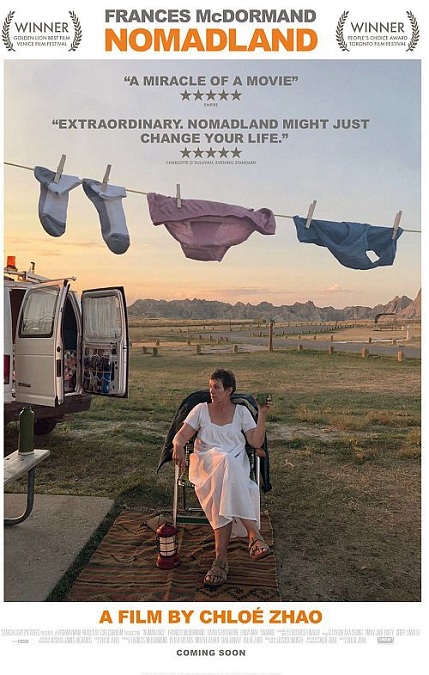



Nomadland – 2020-21
Well this has certainly been a rough year. This year the Academy decided to extend the nomination season to include the beginning of the next year because the Pandemic threw off nearly every aspect of nearly everyone’s lives, and Hollywood was certainly not immune. Movie release dates were pushed back across the board, and movie theaters were shut down. Even now, a year and three months after the world went into lockdown, movie theaters are just beginning to open up again.
But the world continues turning, and movies continue to get made. This year’s winner of the Best Picture award was a movie that was rather simply made. I mean that there were few, if any, special effects, no CGI, certainly no green-screening or composite shots. The story, if you want to call it that, wasn’t complex or difficult to understand. The film had a thin plot line, and was generally made up of individual moments and characters sketches that were tenuously strung together into a loose narrative surrounding Fern, played by Frances McDormand, who was also one of the film’s producers. It was like a year in the life of a wanderer.
It was almost like a documentary about a class of American citizens who live a very specific kind of life. As the title of the film suggests, they are modern nomads. They are people who, sometimes by choice, sometimes by necessity, live in vans, trailers, mobile homes, or other vehicles. They say that they are not homeless. They are simply houseless. They travel the open roads, going from place to place, some looking for work, some enjoying the freedom of not having to work at all.
Fern was given a little back-story that involved the death of her husband and the death of her town. Childless and alone, Fern finds work where she can, working for an Amazon warehouse in the North during winter, and working on farms and campgrounds in the south after the Holiday season rush ends. But her friend Linda May invites her to come to come to a desert rendezvous in Arizona. It is here that she meets Bob Wells.
Bob is a kind and gentle man who is like the Nomad guru. He makes Fern feel welcome within the community of nomads, and here, she finds friends and a home. They band together and create a commune. But when the season ends, or when seasonal work opens in another area of the country, they pack up all their belongings and move.
Before watching this movie, I had the misconception that the people in this nomad community were all folks whose lives had beaten them down. Either they had lost their homes, their loved ones, or their families, and they were forced to live out of their cars. Essentially, I thought of them as homeless people, living not on the streets of a city, but on the roads of the country. But though some of these people were closer to that, some of them were there by choice, a concept I find difficult to understand. Why would someone choose to become a nomad, a perpetual wanderer?
But they all had their reasons, and many of these reasons were given voice. And to attest to the realism of these reasons, the movie actually had very few professional actors. When I watched the credits at the end of the film, I saw that most of the cast were real people who simply played themselves. There was Linda, played by Linda May, Bob Wells as Bob, and Swankie, played by Charlene Swankie.
Interesting note: Swankie said, in a panel cast interview that for most of the movie, she just played herself, which was pretty easy. It wasn’t until she had to play scenes which were fabricated for the film that she found how difficult acting actually was. In the film, her character dies of cancer.
Those who were there by choice decided that retirement would be easier without the burden of maintaining a home, paying bills, putting down roots. By assuming the nomadic lifestyle, they would be able to see the country without having to work. They would spend their remaining days on the open road, communing with nature, and being part of the nomad community of fellow travelers.
Fern was on the road by choice, though life had certainly beaten her down and taken what she loved from her. Her motives were a little difficult to grasp, but there are several times in the film when she is presented with the opportunity to settle down, but refuses. Her sister Dolly, played by Melissa Smith, invites her to live with her and her family, though she knows Fern will not accept the offer. She even comments on how, in the past, Fern couldn’t wait to leave home as soon as she was old enough. Later in the film, Fern meets a man named Dave, played by David Strathairn. He is a man with whom she could have a serious relationship. Dave even decides to move in with his son and end his roaming. Dave expresses his romantic feelings for Fern and invites her to settle down with him, but she leaves after only a few days.
You see, another misconception I had about Fern’s character is that she was sad and lonely, a condition that was a direct result of the death of her husband and the death of her home town. But the more I think about it, the more I’m understanding that it wasn’t really true. Her loneliness was periodically relieved when she joined the wider nomad community, led by Bob Wells. And the times in the film where she seemed the most happy, were when she was alone, communing with nature. She is shown visiting the beautiful Badlands National Park, Redwood National Park, and the Pacific Ocean, to name a few.
But here’s my first real problem with the film. My original ideas about the film were more in line with the actual reality of nomadic living than with the fictionalized version of it we are shown. In real life, the houseless people living out of their vans really are only a stone’s throw away from homelessness. The movie ends up playing out like a romanticized fantasy that shows only the good side of nomadic living. The true hardships are rarely shown. And when Dave has to be admitted to a hospital, the film glosses over how he is able to pay for his surgery and treatment.
According to Arun Gupta and Michelle Fawcette, writing for inthesetimes.com, “In the real world, many nomads desperately want a house. One admits ?“there is not so much difference between” the van dweller and the homeless person. By making Fern’s story one of personal responsibility and freedom, the movie erases the causes of the nomads’ economic pain.” And I believe that is probably closer to the truth. Sure, some people are there by choice, but I’m guessing that most of them probably aren’t. Most of them have fallen on hard times
But this wasn’t their story. This was Fern’s story, and she chose the open road where she could, for the most part, work when she wanted, and take her leisure when she wanted. And they certainly went out of their way to make Fern’s story sand and depressing. The score by Ludovico Einaudi used a lot of simple piano music, stark, bare and forlorn, and yet beautiful, much like Fern’s existence.
And that brings me to the second problem I had with the film. It was too slow and heavy-handed. Yeah, it is a heavy drama, but other Best Picture nominated movies like Schindler’s List or Amore can be serious and depressing without being so self-important and plodding.
Now, I’m not saying that this was a bad movie that shied away from the truth, painting a completely unrealistic picture of this subculture of American nomads, though there certainly is a bit of that going on. It was an interesting movie, and the non-actors in the cast did a good job. I especially liked Linda, Swankie and Bob Wells. The story of Linda nearly committing suicide, the story of Swankie’s impending cancerous death, and Bob’s telling of his son’s suicide were tales that easily touched my heart, and I felt for them, even if those stories were fictional. The real Swankie wasn’t dying of cancer.
But just don’t go into the movie expecting to learn all there is to know about these nomads. The realism only went so far. The rest was tailor-made to tug at the heart-string. Still, I thought Frances McDormand did a really good job with the material, and the director, Chloe Zhao, dealt with the subject matter in a sensitive way, if not altogether honest. I believe they both deserved the Individual Oscars they won for Best Actress and Best Director.
Interesting Note: Both of these Oscar wins were historically significant. McDormand was the first person to ever win Academy Awards as best producer and performer for the same film. Zhao was the second woman and the first Chinese person to ever win the award for Best Director.
So, all in all, I’m not sure if I agree with its Best Picture win. Granted, it is the first of this year’s nominees I have watched, but I wasn’t overly impressed with the film. For my tastes, it was too slow and uneventful, with a thin narrative that barely had a cohesive story-line. Sure, it had a small amount of social relevance, but such a collection of short character studies does not a Best Picture winner make. But maybe, just maybe, it was completely appropriate for such a difficult and disconnected year as 2020.








